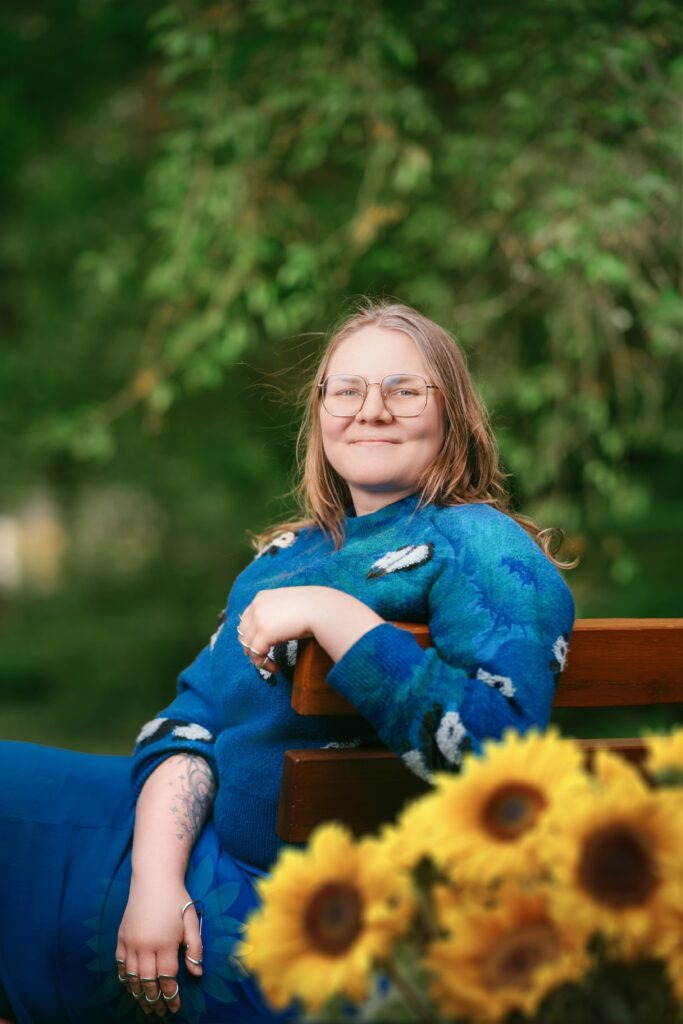
In 2019, Susanna was reading medical research about lipedema (a chronic disorder of fat distribution) when she found herself in an unexpected statistic: 50% of women in the study also had Ehlers-Danlos Syndrome. “I noticed, oh, I’m quite bendy, really flexible. And that looks similar.”
It would take another five years—until 2024—to get official confirmation of what she already knew. By then, Susanna had already been diagnosed with Multiple Sclerosis, held leadership positions within Multiple Sclérose Lëtzebuerg and the European Multiple Sclerosis Platform, published medical research of her own, and would soon start the patient advocacy organisation PatEx. But before we expand on any of this, there is a key message and lesson in here: the woman who once struggled to get doctors to listen had to become a recognised expert herself.
“”I have to keep a good budget. “It’s a bit like a credit card. But instead of euros you withdraw energy. It’s useful, but you have to be careful that you don’t go too much into debt. Withdraw more than you can put back in, and it can become incredibly difficult to get your account back in order.”“
At 36, this metaphor guides everything from family outings to founding the Académie des Patients Experts. “Becoming over-indebted in terms of available energy is not something I would advise anyone.” To then learn about all she does with the energy available to her is inspiring.
Living at the Intersection
“With MS and Ehlers-Danlos Syndrome, they share one symptom: fatigue. And that’s why you don’t really know where one ends and the other begins,” Susanna explains. “It’s basically an interesting mix, because the two diseases overlap, but they have very different causes.”
Ehlers-Danlos affects connective tissue—the tissue that holds the body together—and is genetic, affecting approximately one person in 5,000. She grew up with it unknowingly: “Many things I wanted my body to do just didn’t work as they should have if I didn’t have some underlying condition.” Multiple Sclerosis, an autoimmune disease where the immune system attacks healthy tissue in the nervous system, arrived later.
The overlap creates unique challenges. “We had planned an outing with the family for example and I couldn’t go along, because I knew if I do that now, then I won’t have any energy left to do other necessary things.” Every activity requires calculation. “You have to set priorities. That’s immensely important when you have a chronic illness. Sometimes you also have to say no—’I can’t now’ or ‘I love this project, I’d like to participate in it, but my health doesn’t allow it at the moment.'”
Unexpected Paths to Diagnosis
Susanna’s diagnostic journeys illustrate the different experiences in how conditions reveal themselves. Multiple Sclerosis revealed itself most dramatically. “I had problems with my eyes” in 2012, Susanna recalls, “but nobody could really find what it was.”
In 2015, a blind-date her friends encouraged her to go in 2015 ended when she suffered a “grand mal”—a seizure affecting the entire brain. Brain scans revealed lesions. “For those who don’t know what lesions are, they’re like plaques. You can imagine it a bit like when you get a wound and then the body tries to heal it. And then you get that small brown layer of skin covering the wound.” These plaques in the brain are why MS is called “sclérose en plaques” in French.
Within a year of the seizure, she had a relapse showing active inflammation, confirming her MS diagnosis. “A relapse in MS is an activation of the disease—you can see the inflammation in the brain or in the spinal cord.” Compared to the five-year wait for EDS confirmation, this felt “relatively quickly.”
Ehlers-Danlos took the earlier mentioned route of having hidden itself from her before she was doing research on lipedema —another condition she lives with.
Yet confirmation took another five years. “You just don’t find a specialist or anyone who’s willing to go and consider such rare conditions, because they simply don’t have the necessary expertise.” Even with clear symptoms—”my skin is a bit hyperelastic and very soft”—doctors hesitated. “If you don’t have the necessary experience with the disease, doctors are also afraid to make a diagnosis that might not be correct.”
When she finally found one of Europe’s main EDS specialists, she waited eighteen months on his list. “He doesn’t take any more patients because he’s saturated—he simply can’t take on more patients because he only has the same twenty-four hours in a day we have.”
From Patient to Expert to Giving Back
To not let frustration consume her, Susanna channeled her experiences into advocacy and education. She’s published research in Frontiers in Neurology and contributed to a whitepaper after “accompanying patients who were affected by a cancer diagnosis, specifically in the management of their illness and the treatment of their pathology.”
Now she’s founding the Patient Expert Academy / Académie des Patients Experts (patex.lu). “It will be an association that helps young patients or older ones acquire the necessary expertise to become part of the healthcare system.” The academy will teach patients about clinical trials, research methods, and healthcare policy—”to really create a structured role for the patient in our healthcare system.”
Her motivation is of course personal: “Anyone can come to me, ask me about my conditions, because I like to clarify and educate. Then perhaps someone else doesn’t need to wait years to get their diagnosis or find the right treatment, and is saved years of stress and anxiety.” Moreover, she connects this to the exhaustion of having to re-engage with your symptoms and condition time and again: “It’s a really heavy burden when you have to explain everything to everyone again.”
Sexist Healthcare
As a young woman in the healthcare system, Susanna faced additional obstacles. “In medicine it’s often difficult for us as women to get heard and taken serious.” She references research showing “women don’t show the same symptoms as men” for conditions like heart attacks, leading to missed diagnoses. It is one amongst hundreds of examples how the medical literature continues being gender-blind, and women and other minorities facing needless pain and lack of care even if it is otherwise available.
“There’s a real danger that women with undiagnosed illnesses are labelled as just having anxiety, that there’s nothing serious, nothing physical.” She mentions other hard-to-diagnose conditions like MCAS (Mast Cell Activation Syndrome), “which is also very difficult to diagnose.”
Her message or challenge to healthcare providers is direct: “Perhaps listen and simply trust that we know our bodies quite well.” She recommends reading Maya Dusenbery’s book “Doing Harm” as an entry-point to this issue, and getting yourself ready to advocate for yourself. Possibly with help from the Académie des Patients Experts.
Strategising Travel
Air travel requires careful planning, but Susanna has developed effective strategies. “I like to take assistance at the airport, because that simply helps me to avoid things like standing for long periods.” She adjusts based on context—skipping assistance at small Luxembourg Airport but using it at larger hubs.
Berlin’s Sunflower programme particularly impressed her. “I got such a nice lanyard, they escorted me to my gate, everything was clearly marked. It was well signposted where you had to go.” For longer journeys, like her holiday to Cape Verde, assistance proved essential: “They came to find me still in the plane already. They went with me to look for my luggage and waited with me until the bus. It couldn’t have been a better experience.”
Her advice to airport staff balances gratitude with guidance: “The most important thing is to listen to people. When you have assistance or when you say, I need that, simply listen and look where you can accommodate.” She emphasises appreciation: “Not everything is always done badly. There are also positive things. The people who really make such an effort to make the flight more pleasant for you—simply say a big thank you once.”
What’s still missing are sensory regulation rooms—”a room where the different sensory inputs are reduced a bit—less noise, fewer people.” She remains optimistic: “That will certainly come, because it’s something that comes with time.”
For those with EDS, practical needs matter: “There must definitely always be a place where you can rest. Sometimes, with my EDS for example, your back doesn’t always cooperate as you’d like and then it hurts. When there’s a small place where you can sit down or support yourself, that helps.”
The Bigger Picture
“The most important thing everyone should know is that it’s nobody’s fault,” Susanna emphasises. “You haven’t caused something yourself to then become ill. That’s absolutely not the case. And we often look for the fault in ourselves. But that’s not necessary at all.”
Her advice combines intuition with community: “Definitely always listen to your gut feeling. When you already have a small negative impulse, say no directly—I’d rather keep my hands off it.” Equally crucial is support: “Have the right colleagues in life, have good people, have positive things, focus on the positive. Without that, I think, it becomes difficult in life—and not just for people with Multiple Sclerosis or Ehlers-Danlos Syndrome. We all have to be careful that we give our energy to what’s worth it.”
Through everything, she maintains perspective born from experience: “It always gets better again—please don’t ask me how, but somehow it always gets better again, even if it takes its time.” This isn’t empty optimism but lived wisdom. “That’s what you should believe in and hold on to, because often it doesn’t look like the world will ever stabilise again or like you’ll ever get better. But that’s not the case.”
Chronic illness has brought unexpected gifts: “The extreme resilience I’ve built up, and I’ve been able to build up a lot of understanding for other people too.” Her Patient Expert Academy (patex.lu) represents her commitment to systemic change. “I hope that we can reach many people who would also then get trained.”
“Young people can also live with a disability, with an impairment, with illness,” she insists. “Just because we look super nice doesn’t mean we have nothing that impacts us.” Her final message cuts through assumptions: “Not everything has to be understood completely, but a willingness to understand already helps a lot. One should be careful not to judge so quickly. Simply accept people.”
When asked about her ideal escape, she laughs: “I’d most like to get on a plane tomorrow and go somewhere carefree on an island drinking cocktails and simply enjoying the sun.” Then, with characteristic practicality: “But I think we’ll have to wait a bit for that. I think the best time to fly there is from November until April.”
(To learn more about Susanna’s work, visit Patient Expert Academy / Académie des Patients Experts (patex.lu))



